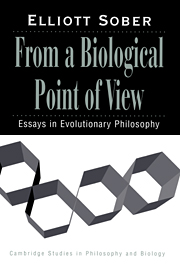Book contents
- Frontmatter
- Contents
- Acknowledgments
- Introduction
- 1 Did evolution make us psychological egoists?
- 2 Why not solipsism?
- 3 The adaptive advantage of learning and a priori prejudice
- 4 The primacy of truth-telling and the evolution of lying
- 5 Prospects for an evolutionary ethics
- 6 Contrastive empiricism
- 7 Let's razor Ockham's razor
- 8 The principle of the common cause
- 9 Explanatory presupposition
- 10 Apportioning causal responsibility
- 11 Evolution, population thinking, and essentialism
- 12 Temporally oriented laws
- Index
5 - Prospects for an evolutionary ethics
Published online by Cambridge University Press: 14 January 2010
- Frontmatter
- Contents
- Acknowledgments
- Introduction
- 1 Did evolution make us psychological egoists?
- 2 Why not solipsism?
- 3 The adaptive advantage of learning and a priori prejudice
- 4 The primacy of truth-telling and the evolution of lying
- 5 Prospects for an evolutionary ethics
- 6 Contrastive empiricism
- 7 Let's razor Ockham's razor
- 8 The principle of the common cause
- 9 Explanatory presupposition
- 10 Apportioning causal responsibility
- 11 Evolution, population thinking, and essentialism
- 12 Temporally oriented laws
- Index
Summary
TWO KINDS OF QUESTION
Human beings are a product of evolution. This means that the existence of our species is explained by the process of descent with modification. But, in addition, it also means that various phenotypic characteristics of our species – features of morphology, physiology, and behavior – have evolutionary explanations.
Some see in this simple idea the promise of a new understanding of the problems of ethics. Others grant its truth, but reject its relevance. The first group insists that if evolutionary biology can provide insights into the workings of the human mind, these insights cannot fail to transform our understanding of right and wrong. But for the doubters, the fact that human beings have an evolutionary past has no more significance than the fact that the human body must obey the laws of physics. It is true that our bodies are subject to the law of gravity, but apparently that is of little help in understanding why we think and act as we do.
To assess the relevance of evolutionary ideas to the problems of ethics, we must distinguish two quite different projects. The first is the task of accounting for why people have the ethical thoughts and feelings they do.
- Type
- Chapter
- Information
- From a Biological Point of ViewEssays in Evolutionary Philosophy, pp. 93 - 113Publisher: Cambridge University PressPrint publication year: 1994
- 8
- Cited by

